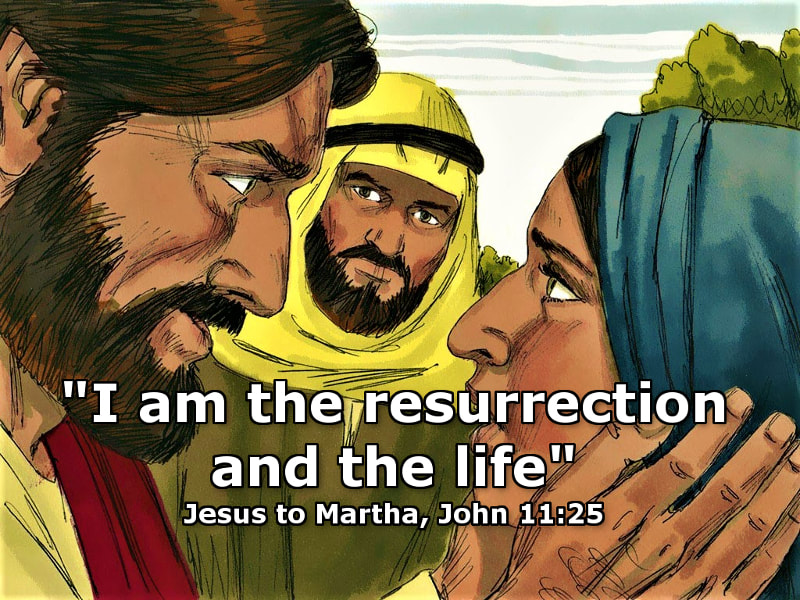"But God, being rich in mercy, because of the great love with which he loved us, even when we were dead in our trespasses, made us alive together with Christ—by grace you have been saved." (Ephesians 2:4-5)
God has made believers in Christ alive together with Christ. We identify with the resurrection of Christ, and God gives us a new quality of life -- eternal life.
Consider. If you are a believer in Christ, how would you describe to an inquisitive unbeliever or a new believer what it means to be "made alive together with Christ"?
1. Who is Paul writing to?
Paul begins his letter, "Paul, an apostle of Christ Jesus by the will of God, to the saints who are in Ephesus, and are faithful in Christ Jesus:" (Ephesians 1:1). The Greek word for saints is hagios (hag'-ee-os) which means different or holy. Christians are different from the world because we are like the Lord (Ref. 1). Clearly, Paul is writing to believers in Jesus Christ.
2. What was the former spiritual condition of the Ephesian believers before God made them alive together with Christ?
Paul writes, "And you were dead in the trespasses and sins in which you once walked, following the course of this world ..." (Ephesians 2:1-2). In the same way, without Christ, we were dead in our trespasses and sins. We inherited our spiritual "deadness" from Adam (Genesis 2:16-17, Genesis 3:6). Romans 5:12 says, "When Adam sinned, sin entered the world. Adam’s sin brought death, so death spread to everyone, for everyone sinned" (Romans 5:12 NLT).
Trespasses are a lapse or deviation from the truth, a slip-up, or an error that can be unintentional or willful (Ref. 2). Sins are thoughts, words, or deeds where we miss the mark or target (Ref. 3). 3. Even when we were dead in our trespasses and sins, before we were in Christ, God loved us.
God's divine attributes of mercy and love moved God to plan for and provide for our salvation (Ephesians 1:3-5, Ephesians 2:4-5, Colossians 2:13-14). Romans 5:8 tells us, "But God shows his love for us in that while we were still sinners, Christ died for us." Jesus said about himself, "For God so loved the world, that he gave his only Son, that whoever believes in him should not perish but have eternal life. For God did not send his Son into the world to condemn the world, but in order that the world might be saved through him" (John 3:16-17).
4. Together with Christ, God has made us alive.
Ephesians 2:5 tells us (believers) that God has made us alive together with Christ. In the Greek, the verb does not just say "made alive." It says, "made alive together with" (Ref. 4). Strong's Exhaustive Concordance defines this verb, suzóopoieó (sood-zo-op-oy-eh'-o), as "to reanimate conjointly with, (figuratively) -- quicken together with." As believers in Christ, we identify with and are co-joined with Christ in his resurrection. Paul writes, "If you confess with your mouth that Jesus is Lord and believe in your heart that God raised him from the dead, you will be saved" (Romans 10:9).
5. When God makes us alive together with Christ, God gives us a new quality of life -- eternal life.
When we believe in Jesus Christ and in his resurrection, God makes us alive together with Christ. God gives us a new quality of life -- eternal life (Romans 6:23). Eternal life begins for the believer when they put their faith and trust in Christ, and continues after their physical death (John 11:25-26, Ref. 6).
Being made alive in Christ results in a new quality of life. The Greek word for eternal in eternal life is aiónios, which means perpetual, unending, age-long (Strong's Concordance, Ref. 5, Ref. 6). Aiónios includes the character of that which lasts for an age, as contrasted with that which is brief and fleeting (Ref. 5, Ref. 6). "Aiónios does not focus on the future per se, but rather on the quality of the age it relates to. People who are alive spiritually in Christ live in eternal life right now, experiencing this quality of God's life now as a present possession" (Helps Word-studies, Ref. 5, Ref. 6).
Apply. If you already are a believer in Jesus Christ, praise God that God has made you spiritually alive together with Christ. Thank God for the quality of new life that he has given you in Christ. If you are not yet a believer in Jesus Christ, put your faith and trust in him today. He will forgive your trespasses and sins. He will make you spiritually alive together with himself, and he will give you a new quality of life -- eternal life.
Related Lessons
"What is Eternal Life?" (John 17:3) "Jesus is the Resurrection and the Life (Job's Question, Jesus' Answer)" (Job 14:14, John 11:25-26) "Jesus Christ is the Life - John 14:6" "Jesus is the Way to Heaven" (John 14:6)
References
1. https://biblehub.com/greek/40.htm 2. https://biblehub.com/greek/3900.htm 3. https://biblehub.com/greek/266.htm 4. https://biblehub.com/greek/4806.htm 5. https://biblehub.com/greek/166.htm 6. http://www.scriptureway.com/home/what-is-eternal-life
3 Comments
Image: GoodSalt.com - used under license
"And he was saying, 'Jesus, remember me when You come into Your kingdom!' And He said to him, 'Truly I say to you, today you will be with Me in Paradise.'" (Luke 23:42-43)
Consider. For the person who puts their faith in Jesus, upon the death of their body, their soul goes immediately to be with Jesus in Paradise.
Two thieves were crucified with Jesus that day - one on the right and the other on the left (Luke 23:33). Both thieves were next to the One who could save them. Yet, one thief hurled abuse (literally, blasphemed) at Jesus (Luke 23:39, Ref. 1). The other, penitent thief recognized that he himself was guilty yet Jesus was innocent. The penitent thief said, "Jesus, remember me when You come into Your kingdom!" (Luke 23:40-42). To this thief, the penitent thief, Jesus said, "Truly I say to you, today you will be with Me in Paradise" (Luke 23:43).
Jesus' promise to the penitent thief has brought hope to millions of believers over the centuries since Jesus' death and resurrection. Jesus' promise to the penitent thief brings believers hope today as we consider the destination of our souls upon our death and the destination of the souls of our loved ones.
In the next two sections, I would like to focus on two important points, or "take aways" from Jesus' promise to the penitent thief.
Paradise is Where Believers Will Be with Jesus after Death
Jesus could have told the penitent thief, "Today you will be in Paradise." But Jesus did not say that. Jesus said, "Today you will be with Me in Paradise" (Luke 23:43, underline added).
Paradise in Greek is paradeisos (par-ad'-i-sos), which is "an ancient Persian word meaning 'enclosure, garden, park'" (Ref. 2). Paradise is mentioned in the New Testament only three times - in Luke 23:43, 2 Corinthians 12:4, and Revelation 2:7. The Apostle Paul expressed his desire (his passionate longing) to be with Jesus after his death when he wrote, "But if I am to live on in the flesh, this will mean fruitful labor for me; and I do not know which to choose. But I am hard-pressed from both directions, having the desire to depart and be with Christ, for that is very much better" (Philippians 1:22-23, Ref. 3). Likewise, the early Christians were encouraged, that when they were absent from their body, they would be at home with the Lord (2 Corinthians 5:8, Ref. 4). Note that Jesus' promise to the penitent thief, "Today you will be with Me in Paradise," did not apply to the unrepentant thief who verbally abused Jesus and did not believe in him. Scripture teaches that the souls of the unrighteous go to the place of torment Jesus described in Luke 16:22-26 . There they await judgment and the second death (Revelation 20:11-15). It is far better to believe in Jesus during our earthly lifetime and to have his assurance that upon the death of our body our soul will be in Paradise with him. The Souls of Believers Immediately Enter Paradise to be with Jesus after Death
Jesus told the penitent thief, "Truly I say to you, today you will be with Me in Paradise" (Luke 23:43, underline added). Not tomorrow. Not some time in the future. Today. Jesus spoke to the penitent thief in language that he would understand. Even though their dead bodies would be on the cross or in the grave (Luke 23:50-53), the souls of the Savior and the penitent thief would be alive and in Paradise together that day (Ref. 5).
Another biblical example illustrates a believer's expectation of going immediately to be Jesus upon his death. At the time of his death from stoning, Stephen the martyr said, "Lord Jesus, receive my spirit!" Then he died (Acts 7:57-60).
Apply. Let the words of Jesus to the penitent thief comfort you as you consider the destination of your soul upon your death. "Truly I say to you, today you will be with Me in Paradise" (Luke 23:43).
Put your faith and trust in Jesus who is the Messiah, the Christ, the Son of God. You will receive God's gracious gift of eternal life (Romans 6:23), and upon the death of your body, your soul will go to Paradise to be with Jesus.
Related Lesson
"What is Eternal Life?" (John 17:3) "What is the Tree of Life in the Bible?" (Genesis 2:9, Revelation 2:7)
Updated 3 July 2024
Photo source: FreeBibleImages.org
"Jesus said to her, 'I am the resurrection and the life; he who believes in Me will live even if he dies, and everyone who lives and believes in Me will never die. Do you believe this?' " (John 11:25-26)
Consider. Do you believe in Jesus, and do you believe that you will live in him even after your physical death?
This lesson discusses Job's question, "If a man dies, will he live again?," (Job 14:14), and Jesus' answer, "I am the resurrection and the life; he who believes in Me will live even if he dies" (John 11:25).
The scriptures quoted in this lesson are from the New American Standard Bible, 1995 version, unless noted otherwise (Ref. 1).
Job's Question - "If a man dies, will he live again?"
Job asked, "If a man dies, will he live again? All the days of my struggle I will wait until my change comes" (Job 14:14). Job looked forward to a future time when he would be changed and revived from death. The Hebrew word for change in Job 14:14 is chaliphah (pronounced as khal-ee-faw'). Chaliphah means a change of garments (Genesis 45:21-22) as well as revival after death (Job 14:14, Ref. 2).
Job also believed that in a future time in the flesh he would see God. "As for me, I know that my Redeemer lives, and at the last He will take His stand on the earth. Even after my skin is destroyed, Yet from my flesh I shall see God" (Job 19:25-26). Jesus' Answer - "I Am the Resurrection and the Life"
John, the disciple of Jesus, wrote in John 11:1-5 about Jesus receiving news his friend Lazarus was sick. Jesus waited two more days (John 11:6), and then he took his disciples to Bethany, the village of Mary, Martha, and Lazarus (John 11:1). Jesus knew before he traveled to Bethany that Lazarus already was dead (John 11:14).
When Jesus came to Bethany, Martha came out to meet him (John 11:20). Martha said to Jesus, "Lord, if You had been here, my brother would not have died" (John 11:21). Jesus assured her, "Your brother will rise again" (John 11:23). Martha replied to Jesus, "I know that he will rise again in the resurrection on the last day" (John 11:24). The Greek word for resurrection in John 11:24-25 is anastasis (pronounced as an-as'-tas-is), which means standing up again, referring to physical resurrection of the body (Ref. 3). Note that Martha believed in a resurrection - as a future event. Believe in Jesus - Receive Eternal Life
Jesus then turned his discussion with Martha to the present. Jesus told Martha, and these words assure us today -- "I am the resurrection and the life; he who believes in Me will live even if he dies, and everyone who lives and believes in Me will never die. Do you believe this?" (John 11:25-26).
Job's question was, "If a man dies, will he live again?" (Job 14:14). Jesus answered Job's question in the affirmative (yes) and with a promise. Jesus' promise is that when you believe in (trust in, have faith in) him you will live even after your physical death (Ref. 4). Jesus is referring to the eternal life of our soul and spirit which begins during this earthly life when we believe in him, and that eternal life continues with Jesus after our physical death ("What is Eternal Life"- Ref. 5).
Apply. Jesus said to Martha, "I am the resurrection and the life; he who believes in Me will live even if he dies, and everyone who lives and believes in Me will never die" (John 11:25-26). Then Jesus asked Martha, "Do you believe this?" ... (pause) Do you believe this?
Related Lessons and Resources
"What is Eternal Life?" (John 17:3) "Bible Verses About Eternal Life" "Made Alive Together with Christ - A New Quality of Life" (Ephesians 2:45) "Paradise, Jesus, and the Penitent Thief" (Luke 23:42-43)
"This is eternal life, that they may know You, the only true God, and Jesus Christ whom You have sent." (John 17:3)
"Life eternal, then, is not mere conscious and unending existence, but a life of acquaintance with God in Christ." (Jamieson-Fausset-Brown Bible Commentary, Ref. 1)
This lesson describes the biblical definition of eternal life. This lesson primarily uses the Scriptures about eternal life in the Gospel of John. In the next lesson in the series, we will focus on who receives eternal life and how to receive eternal life.
Consider. Think for a moment. How would you define eternal life? How would you explain eternal life to an inquisitive unbeliever, or to a new Christian? For believers in Christ, eternal life certainly includes living with God after our physical death (John 11:25-26). However, the Bible has much more to say about the characteristics of eternal life.
Eternal life is a free gift of God to believers in Jesus Christ.
The Apostle Paul states, "For the wages of sin is death, but the free gift of God is eternal life in Christ Jesus our Lord" (Romans 6:23). In this verse, the Greek word for gift is charisma. Charisma means a gift of grace, an undeserved favor (Ref. 2). Thus, eternal life is not something we deserve or earn. Eternal life is an undeserved gift of God's grace and favor. "In spite of your sanctification as Christians, still you will not have earned eternal life; it is the gift of God’s grace" (Ref. 3).
Jesus said, "My sheep hear My voice, and I know them, and they follow Me; and I give eternal life to them, and they will never perish; and no one will snatch them out of My hand" (John 10:27-28). For the believer, eternal life begins in the present, the here and now.
Jesus described eternal life in the present tense. Thus, eternal life is not just in the future, but is a present possession of the believer which continues into the future.
John 3:36 - "He who believes in the Son has eternal life; but he who does not obey the Son will not see life, but the wrath of God abides on him." John 5:24 - "Truly, truly, I say to you, he who hears My word, and believes Him who sent Me, has eternal life, and does not come into judgment, but has passed out of death into life. John 6:47 - "Truly, truly, I say to you, he who believes has eternal life." In John 5:24, note the importance of hearing Jesus' words. Jesus said, "He who hears My word, and believes Him who sent Me, has eternal life." For believers in Christ, eternal life continues with God after our physical death.
Jesus said to Martha, "I am the resurrection and the life; he who believes in Me will live even if he dies, and everyone who lives and believes in Me will never die. Do you believe this?" (John 11:25-26).
To the thief on the cross who asked Jesus to remember him, Jesus said, "Truly I say to you, today you shall be with Me in Paradise" (Luke 23:42-43). Jesus said to his disciples, "In My Father’s house are many dwelling places; if it were not so, I would have told you; for I go to prepare a place for you. If I go and prepare a place for you, I will come again and receive you to Myself, that where I am, there you may be also" (John 14:2-3). Jesus defined eternal life as knowing God experientially.
"Jesus spoke these things; and lifting up His eyes to heaven, He said, 'Father, the hour has come; glorify Your Son, that the Son may glorify You, even as You gave Him authority over all flesh, that to all whom You have given Him, He may give eternal life. This is eternal life, that they may know You, the only true God, and Jesus Christ whom You have sent" (John 17:1-3).
In John 17:3, the Greek word for know is ginóskó. Ginóskó means to know, especially through personal experience (first-hand acquaintance) (HELPS Word-studies, Ref. 4). Knowing God experientially requires knowing Jesus who is the truth (John 14:6), as well as knowing and living the Word of God on a daily and life-long basis. "This life eternal, then, is not mere conscious and unending existence, but a life of acquaintance with God in Christ" (Ref. 1). Eternal life is a quality of life, not just the duration of life.
The Greek word for eternal is aiónios, which means perpetual, unending, age-long (Strong's Concordance, Ref. 5). Aiónios includes the character of that which lasts for an age, as contrasted with that which is brief and fleeting (Ref. 5). "Aiónios does not focus on the future per se, but rather on the quality of the age it relates to. Thus, believers live in eternal life right now, experiencing this quality of God's life now as a present possession" (Helps Word-studies, Ref. 5).
Summary. Eternal life is a free gift of God to those who believe in Jesus Christ. Eternal life begins when we put our faith in Jesus. As believers in Christ, eternal life continues with God after our physical death. Eternal life is the quality of life that results when we know Jesus Christ by experience, on a first-hand basis.
Apply. Think for a moment. In your own words, how would you describe eternal life? Write down your description of eternal life in a few sentences. What Scripture verse would be your key reference?
Related Lessons
"Paradise, Jesus, and the Penitent Thief" (Luke 23:42-43) "What is the Tree of Life in the Bible?" (Genesis 2:9, Revelation 2:7) "Made Alive Together with Christ - A New Quality of Life" (Ephesians 2:4-5) "Jesus is the Resurrection and the Life (Job's Question, Jesus' Answer)" (Job 14:14, John 11:25-26) |
Daily Bible Verse(Click the link above) AuthorMr. Whitney V. Myers. Christian. For more information, please visit the Author Page. Posting ScheduleI plan to provide new postings about once a month. Planned Topics(subject to change) Recent Posts(most recent three months) Popular Posts(top 10) Categories
All
Archives
July 2024
|
|
Copyright 2018-2024 Whitney V. Myers |
Listed in Feedspot's Top 100 Bible Study Blogs and Websites |




 RSS Feed
RSS Feed
